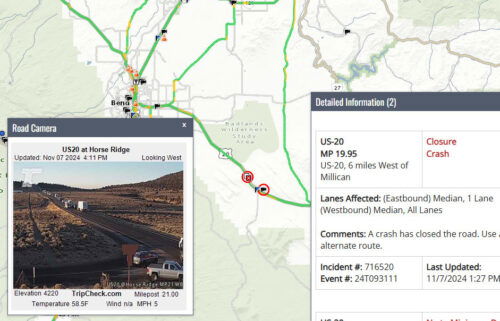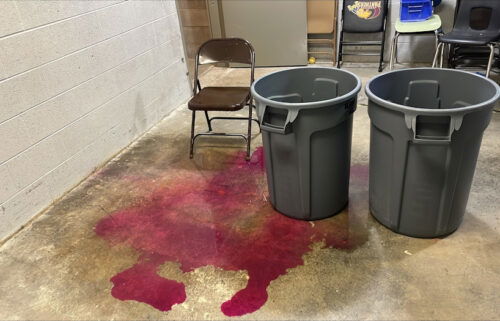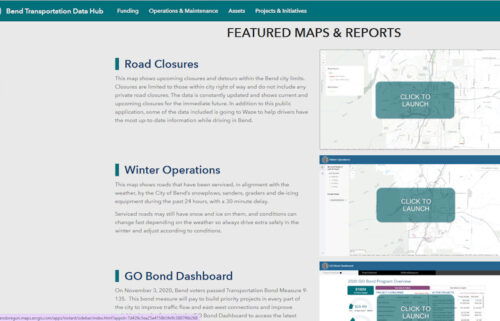Councilors review Old Bend Neighborhood parking program, get earful about homeless camps
(Update: Adding video, comments)
Several speakers decry Juniper Ridge, vow to fight it, other possible homeless sites - councilors react emotionally
BEND, Ore. (KTVZ) -- As Bend welcomed in the new year in 2021, the Old Bend Neighborhood also ushered in a new residential parking permit pilot program, near Delaware and Florida avenues.
Now, nearly a year later, comes a discussion about whether the pilot program is working as planned.
City councilors looked at the pros and cons of the program over the past year at their meeting Wednesday evening, as Parking Services Manager Tobias Marx presented councilors with survey results from neighborhood residents.
According to Marx, out of the 922 parking spaces available, the city issued more than 1,400 $25 annual permits, which generated $23,500 in revenue, and 300 daily parking transactions for an additional $1,500.
But the city pulled in even more money by issuing nearly 3,200 citations, which generated $87,000 from Dec. 2020 to the end of September.
Marx says with a total parking revenue of $112,000, the financial benefit to the district is estimated to be $50,000, which could be used for improvement projects in the neighborhood.
To get a pulse on the neighborhood's reaction, Marx says the city surveyed 161 people in April-May through phone, email, and general outreach.
Nearly 68% of respondents said the parking district has reduced traffic in the neighborhood, 76% say they were overall satisfied with the pilot program, and 80% were in favor of continuing with residential permits.
Despite positive reviews from residents in Old Bend, some councilors like Barb Campbell are not in favor of moving forward with the program.
"I just continue to believe that this program is profoundly inequitable, that we are taking the public's right of way," Campbell said. "It used to be that any of us could drive down there park on the streets and have equal access."
The pilot program will expire on Dec. 31, so now councilors have to decide whether to keep the program in place. Councilor Melanie Kebler proposed some changes that will be reviewed, such as creating 2- or 4-hour free and paid parking so non-residents also can use spaces in the area.
During the meeting's public comment section, several speakers expressed strong opposition and said they will work together to fight any homeless camp near their or any neighborhoods or schools in the community.
Some called the proposal dangerous, said the process is being rushed, and called for using a county-owned location away from residents.
One speaker, Allison Eilerman of Bend, said mental issues and drug addiction need to be dealt with, but not in residential areas that degrade safe neighborhoods and increase safety risks.
"Think of the possibility of crime. Think about a homeless encampment near your home. Honestly, think about it," Eilerman said. "This is not an economic issue, it's a drug and mental health issue. The problem is not affordable housing, and we shouldn't just hand people housing without anything in return."
Councilor Rita Schenkelberg became emotional, close to tears, after listening to the speakers.
"I feel embarrassed. Like, I actually feel embarrassed," Schenkelberg said. "Like, listening to people in our community not be able to put their own privilege aside to serve the greater community is embarrassing as a leader."
She said she understands their safety concerns and that the city is working to address them, but that she was "so disappointed" by the "blame and shame of people who need support from the community. I hope for better for Bend."
Mayor Pro-Tem Gena Goodman-Campbell echoed those thoughts: "These are human beings."
Responding to those who called the process rushed, Goodman-Campbell said, "We are trying to do our best, with a process that is deliberate and thoughtful," with a goal to "prevent needless deaths from exposure on cold nights like this."
Barb Campbell, in not-unusual fashion, was more blunt:
"Even if it is a 'suggestion,' if you take people and force them to go some place, and it has a fence around it, that's called an internment camp," she said. "We are not building an internment camp. We don't have the ability to pick people up and force them to go anywhere." She said they are instead "trying to find solutions that work for these people (and for) the community at large."



